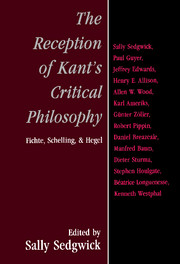Book contents
- Frontmatter
- Contents
- Notes on the Contributors
- Acknowledgments
- Introduction: Idealism from Kant to Hegel
- 1 The Unity of Nature and Freedom: Kant's Conception of the System of Philosophy
- 2 Spinozism, Freedom, and Transcendental Dynamics in Kant's Final System of Transcendental Idealism
- 3 Is the Critique of Judgment “Post-Critical”?
- 4 The “I” as Principle of Practical Philosophy
- 5 The Practical Foundation of Philosophy in Kant, Fichte, and After
- 6 From Critique to Metacritique: Fichte's Transformation of Kant's Transcendental Idealism
- 7 Fichte's Alleged Subjective, Psychological, One-Sided Idealism
- 8 The Spirit of the Wissenschaftslehre
- 9 The Beginnings of Schelling's Philosophy of Nature
- 10 The Nature of Subjectivity: The Critical and Systematic Function of Schelling's Philosophy of Nature
- 11 Substance, Causality, and the Question of Method in Hegel's Science of Logic
- 12 Point of View of Man or Knowledge of God: Kant and Hegel on Concept, Judgment, and Reason
- 13 Kant, Hegel, and the Fate of “the” Intuitive Intellect
- 14 Metaphysics and Morality in Kant and Hegel
- Bibliography
- Index
14 - Metaphysics and Morality in Kant and Hegel
Published online by Cambridge University Press: 03 December 2009
- Frontmatter
- Contents
- Notes on the Contributors
- Acknowledgments
- Introduction: Idealism from Kant to Hegel
- 1 The Unity of Nature and Freedom: Kant's Conception of the System of Philosophy
- 2 Spinozism, Freedom, and Transcendental Dynamics in Kant's Final System of Transcendental Idealism
- 3 Is the Critique of Judgment “Post-Critical”?
- 4 The “I” as Principle of Practical Philosophy
- 5 The Practical Foundation of Philosophy in Kant, Fichte, and After
- 6 From Critique to Metacritique: Fichte's Transformation of Kant's Transcendental Idealism
- 7 Fichte's Alleged Subjective, Psychological, One-Sided Idealism
- 8 The Spirit of the Wissenschaftslehre
- 9 The Beginnings of Schelling's Philosophy of Nature
- 10 The Nature of Subjectivity: The Critical and Systematic Function of Schelling's Philosophy of Nature
- 11 Substance, Causality, and the Question of Method in Hegel's Science of Logic
- 12 Point of View of Man or Knowledge of God: Kant and Hegel on Concept, Judgment, and Reason
- 13 Kant, Hegel, and the Fate of “the” Intuitive Intellect
- 14 Metaphysics and Morality in Kant and Hegel
- Bibliography
- Index
Summary
Even for those who have struggled with Hegel long enough to discover that he is neither a positivist nor a communitarian, nor (at the other end of the spectrum) a Platonist, the fact that he also insists upon distinguishing his appproach to practical philosophy from Kant's may seem deeply puzzling. After all, the two philosophers share in common the same principal opponents. Both set out to undermine the skeptic's doubts about the possibility of objective practical judgments and requirements; both in addition reject positivist derivations of law, exclusively empiricist accounts of human behavior, and intuitionist forms of justification. The two philosophers furthermore seem to share the same conception of the conditions of human freedom. For Hegel as well as Kant, a theory of morality and political right devoted to advancing the cause of freedom must require more than just the absence of obstacles preventing the satisfaction of our animal passions. For Hegel as well as Kant, freedom requires in addition the respect of the ends we have as rational natures. We achieve this kind of freedom when our actions are motivated by the legislation of reason and when the social norms that constrain us are norms we can rationally endorse.
Despite these similarities, Hegel tells us in the Philosophy of Right that the conception of freedom he associates with Kant and discusses under the heading of “Moralität” must give way to the more adequate conception of “Sittlichkeit” or “ethical life.”
- Type
- Chapter
- Information
- The Reception of Kant's Critical PhilosophyFichte, Schelling, and Hegel, pp. 306 - 324Publisher: Cambridge University PressPrint publication year: 2000
- 1
- Cited by



